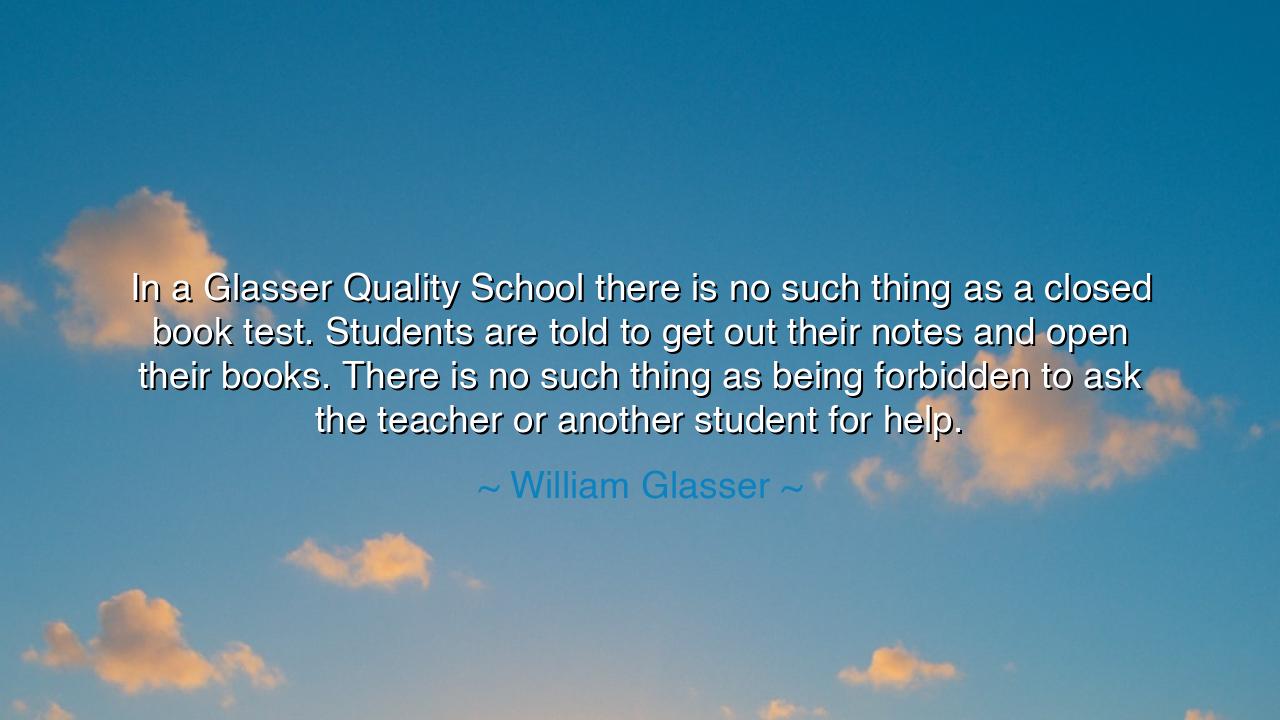
In a Glasser Quality School there is no such thing as a closed
In a Glasser Quality School there is no such thing as a closed book test. Students are told to get out their notes and open their books. There is no such thing as being forbidden to ask the teacher or another student for help.






William Glasser, the physician and prophet of education, once declared: “In a Glasser Quality School there is no such thing as a closed book test. Students are told to get out their notes and open their books. There is no such thing as being forbidden to ask the teacher or another student for help.” These words strike against the iron traditions of schooling, traditions forged in rigidity, silence, and fear. For Glasser saw that true learning is not the memorization of facts under pressure, but the cultivation of wisdom, problem-solving, and cooperation. His vision was not of a prison of rules, but of a living community of inquiry, where knowledge is not hoarded but shared.
The meaning of this quote is found in its challenge to convention. The closed book test represents an old idea: that knowledge must be stored in the memory alone, that the worth of a student is proven by solitary struggle, that learning is a contest of isolation. Glasser turned this on its head. He declared that real education is not about recalling what one has memorized in a vacuum, but about learning how to find, use, and apply knowledge in the presence of others. To open the book is to admit that wisdom is larger than memory. To ask for help is to recognize that understanding is deeper when shared.
The origin of these words lies in Glasser’s philosophy of Choice Theory and Quality Schools. He believed that education must prepare students for the real world—and in the real world, no one forbids us from opening a book, asking a colleague for advice, or seeking the counsel of a mentor. Why, then, should schools train children in methods divorced from life itself? To Glasser, the Quality School is not a place of punishment, but of empowerment, where students learn through freedom, relevance, and connection.
History bears witness to the truth of his vision. Consider the great Library of Alexandria, where scholars from across the ancient world gathered not to conceal their scrolls but to share them, to debate, to question, and to learn in common. The greatness of that institution lay not in closed tests, but in open exchange. Or recall the scientific community of the Enlightenment, when thinkers like Newton, Leibniz, and Voltaire wrote letters to each other, building upon one another’s insights. Human progress has never come from isolation, but from collaboration. In Glasser’s schools, he sought to mirror this timeless truth.
His words also speak to the fear of vulnerability that so often haunts the classroom. Students taught under the closed-book model fear being wrong, fear asking for help, fear being seen as weak. But in the Glasser Quality School, the act of asking for help becomes a strength. The humility to open a book, the courage to seek guidance—these are not failures, but victories of the spirit. For the wise know that learning is not prideful self-sufficiency, but openness to truth wherever it is found.
The lesson for us is this: we must reimagine not only schools, but life itself, as an open book. Do not fear asking for help; do not believe that you must hold all knowledge within your mind alone. Instead, cultivate networks of wisdom—friends, mentors, books, and experiences—and draw upon them as you walk your path. To do so is not to cheat, but to live as the ancients did, gathering wisdom from the community of mankind.
Practically, this means seeking collaboration in all things. In work, do not isolate yourself but ask questions of those who know. In family, do not hide your struggles, but share them with those who love you. In learning, do not fear the open book, for life itself is an open book written in every conversation, every lesson, every failure, and every triumph. To close it is to blind yourself; to open it is to live fully.
So let Glasser’s words echo as an eternal principle: in the Quality School of life, there are no closed books, no forbidden questions, no shame in seeking help. There is only the endless pursuit of wisdom together, as fellow students in the great classroom of the world.






AAdministratorAdministrator
Welcome, honored guests. Please leave a comment, we will respond soon